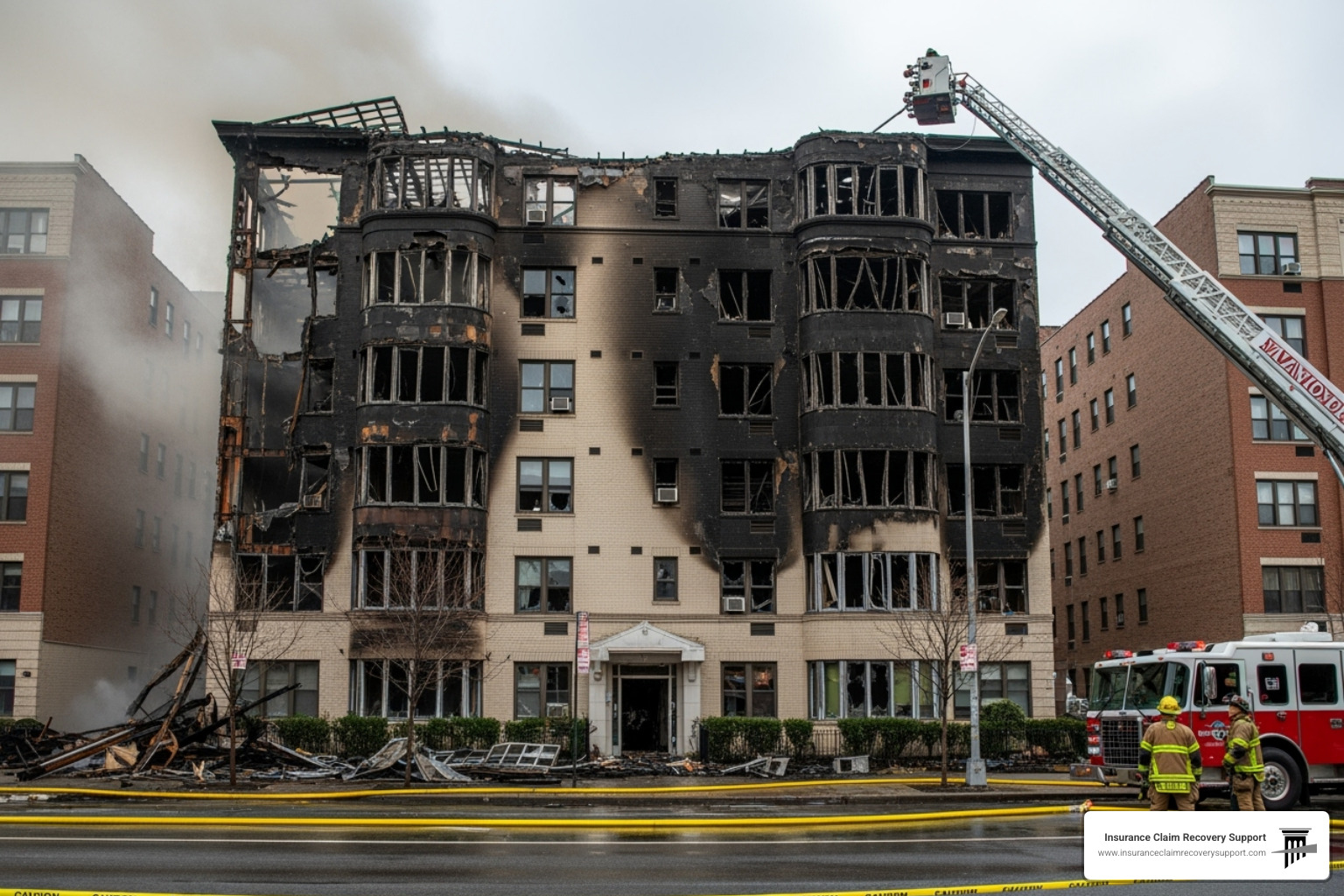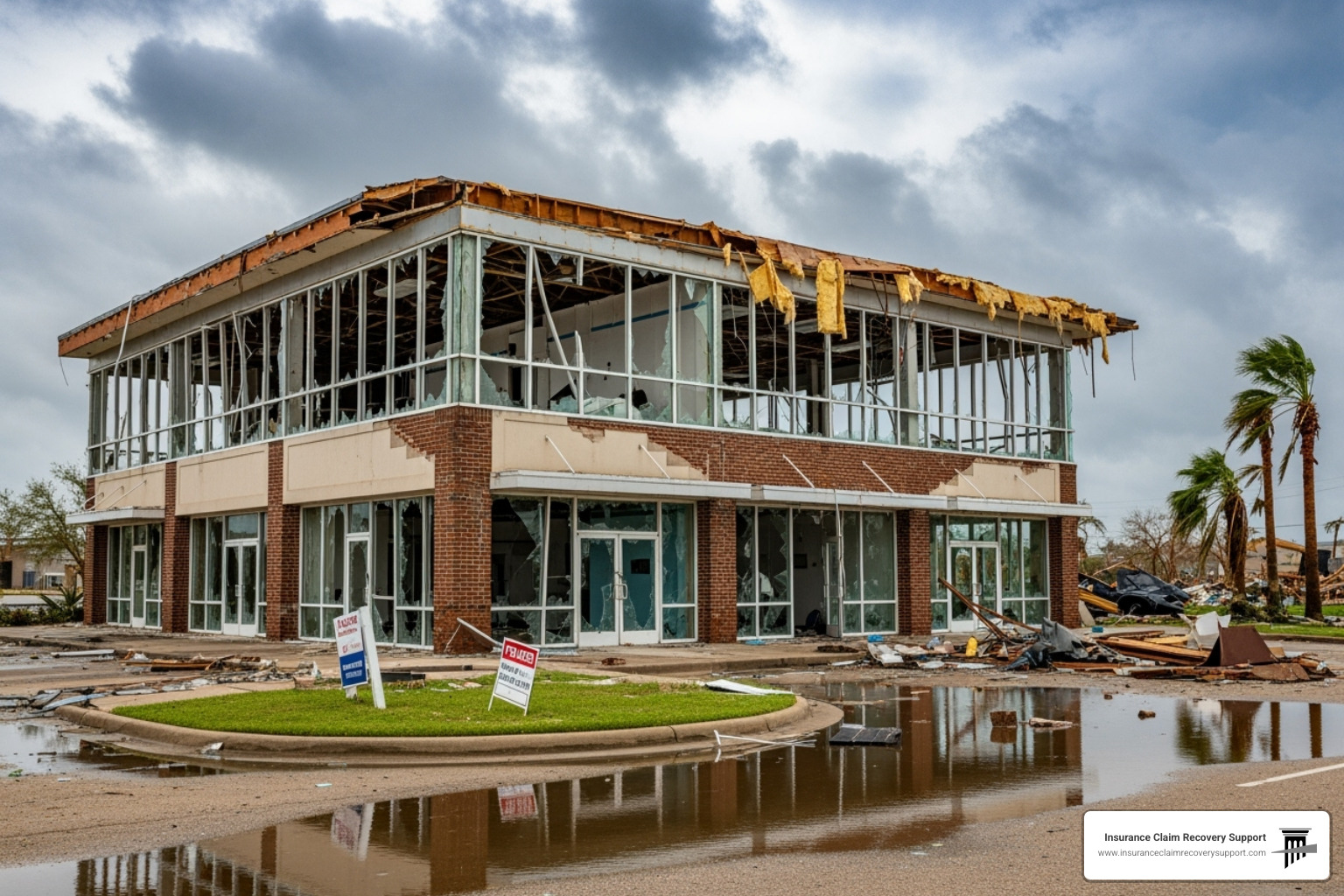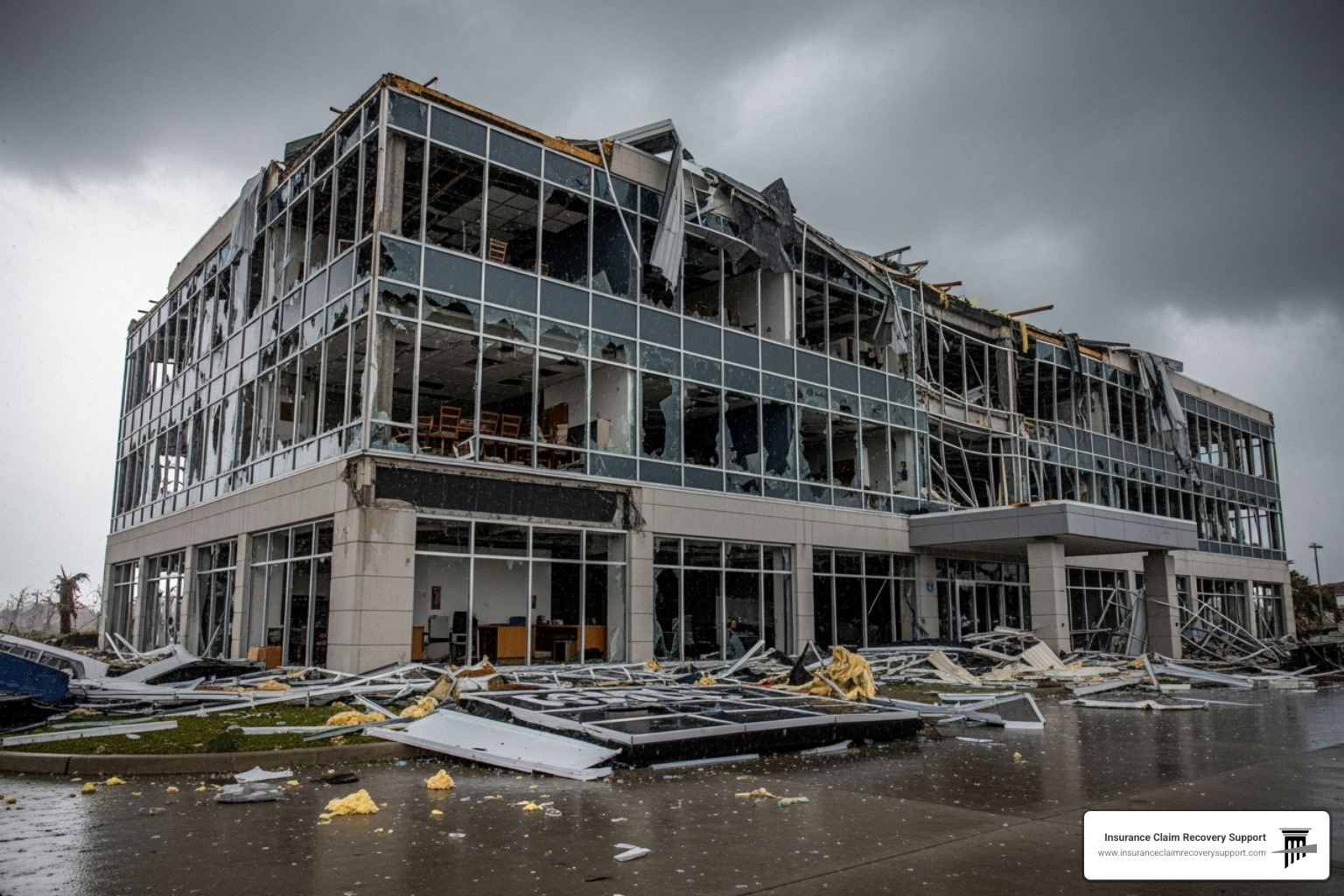The Landlord’s First Steps After a Fire
When a fire damages your rental property, a successful apartment fire insurance claim is the first step to recovery. Immediate action and proper documentation are crucial to securing a fair settlement and avoiding financial disaster.
Essential Steps for Filing Your Apartment Fire Insurance Claim:
- Ensure Safety – Evacuate all occupants and wait for fire department clearance.
- Contact Emergency Services – Call 911 and obtain the official fire report.
- Notify Your Insurer – Report the claim within 24-48 hours to avoid policy violations.
- Secure the Property – Board windows, tarp damaged roofs, and prevent further loss.
- Document Everything – Photograph all damage before cleanup begins.
Fires in residential buildings cause billions in property damage annually, creating complex insurance challenges for apartment owners. A key complexity is the landlord-tenant divide: your policy covers the structure and lost rent, while tenants’ renters insurance covers their personal belongings and temporary housing. Understanding this distinction is vital.
Water damage from firefighting can cause secondary issues like mold, while lost rental income adds financial pressure. Swift, accurate claim handling is essential for your business’s survival.
I’m Scott Friedson, a public adjuster who has settled over $250 million in apartment fire insurance claim cases. I help property owners in Texas and beyond maximize their settlements and avoid the cost and delay of litigation.
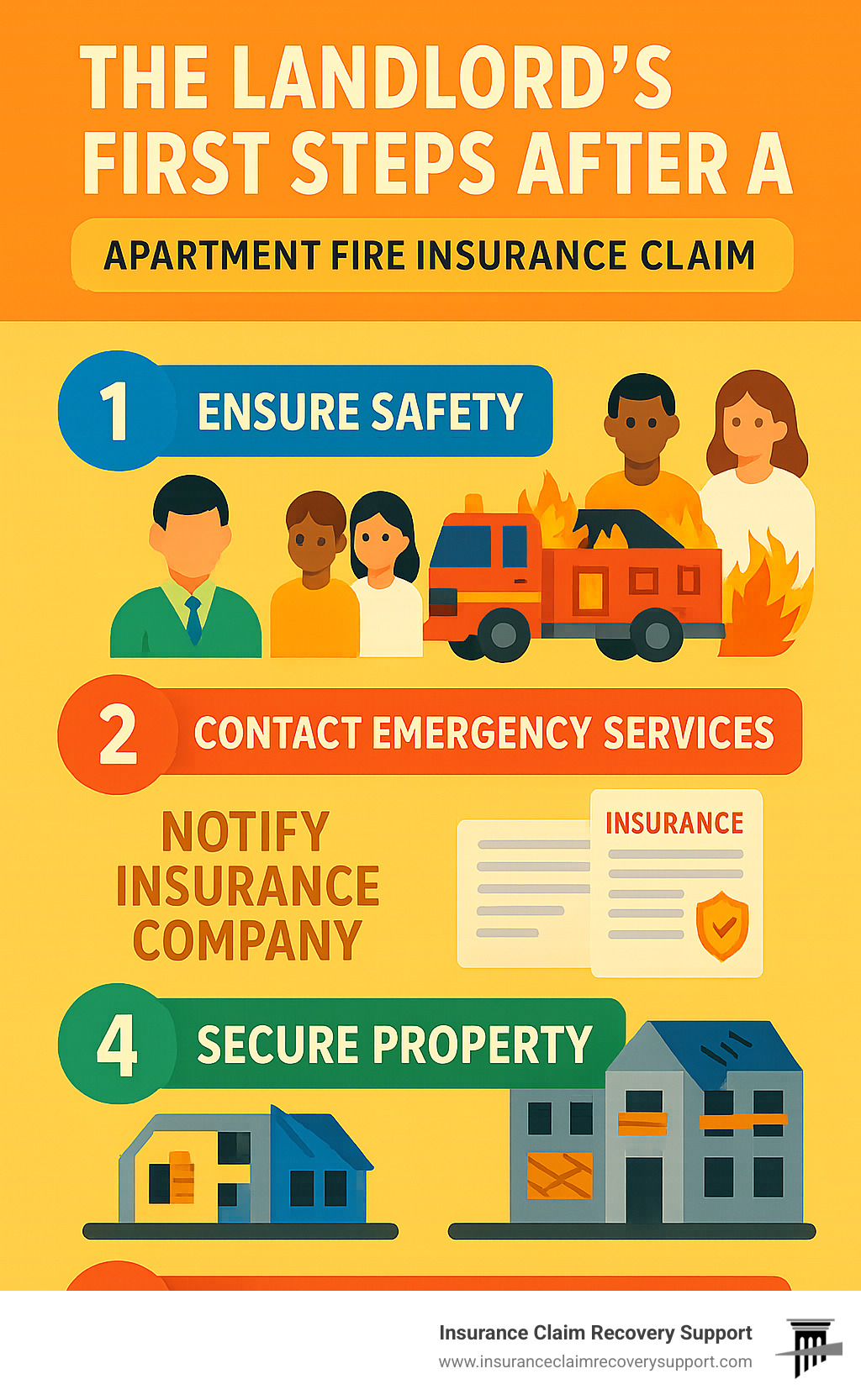
Quick apartment fire insurance claim terms:
The Complete Guide to Your Apartment Fire Insurance Claim
When an apartment fire occurs, landlords must act swiftly. This section details the core process, from understanding your policy to taking critical first steps.
What Your Landlord Insurance Covers (and What It Doesn’t)
Understanding your commercial property insurance is the cornerstone of a successful apartment fire insurance claim. These policies are intricate, and their clauses significantly impact your recovery.
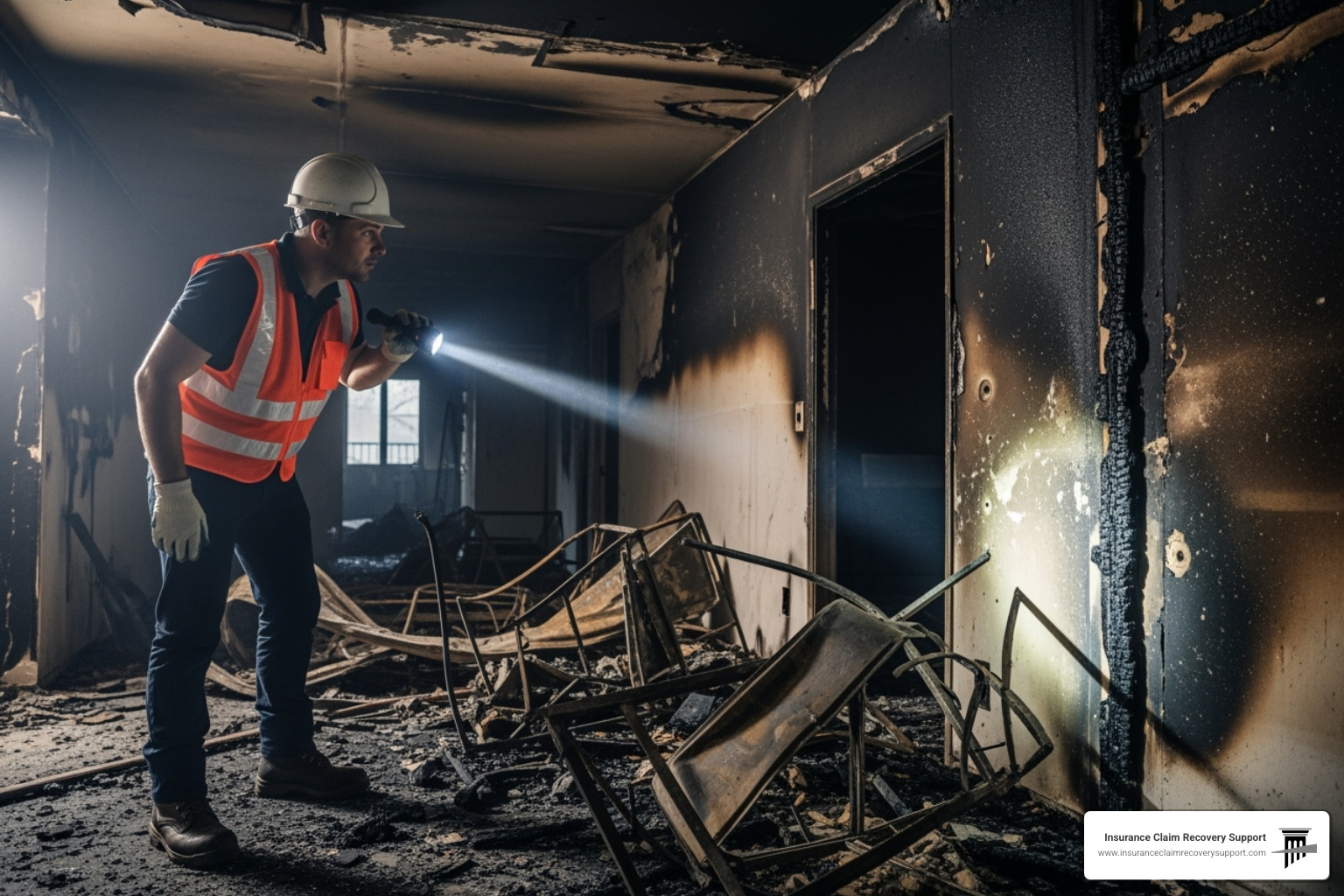
Generally, a landlord’s policy for an apartment complex or multi-family dwelling will cover:
- Structural Damage: Costs to repair or rebuild the physical structure, including walls, roofs, floors, and built-in fixtures damaged by flames, heat, or collapse.
- Smoke and Soot Damage: Specialized cleaning, deodorizing, and restoration for areas permeated by smoke and soot, which can travel far beyond the fire’s origin via HVAC systems.
- Water Damage from Firefighting: Repair costs for damage caused by sprinklers and fire hoses, including secondary issues like mold if not properly remediated.
- Loss of Rental Income (Business Interruption): Compensates you for lost revenue from uninhabitable units during the restoration period, helping your business stay afloat.
- Debris Removal: Covers the substantial cost of cleaning up and hauling away charred remains and damaged materials.
It’s vital to differentiate your landlord insurance from renters insurance. Your policy covers the building and common areas. Renters insurance covers tenants’ personal belongings and their additional living expenses (ALE) for temporary housing.
However, policies have limits and exclusions, such as:
- Arson: Coverage is denied if the fire is intentionally set by the policyholder.
- Gross Negligence: Failure to maintain the property (e.g., ignoring known, severe electrical issues) could lead to disputes or denials.
- Wear and Tear: Policies cover sudden, accidental damage, not gradual deterioration.
- Policy Limits and Deductibles: Every policy has a maximum payout (limit) and an amount you pay upfront (deductible).
For more in-depth information on handling substantial property damage, you can find valuable insights on Large Loss Insurance Claims. We can help you steer these complex aspects, ensuring you understand exactly what your policy entitles you to.
Immediate Actions: Securing Your Property and Mitigating Loss
Once emergency services clear the scene, you must secure the property to prevent further damage. This is your “duty to mitigate,” a requirement in insurance policies. Failure to do so can reduce your settlement.
Here’s what we recommend:
- Boarding Up Windows and Doors: Secure all openings to prevent theft, vandalism, and weather damage.
- Tarping Damaged Roofs: A temporary tarp can prevent rain from causing more water damage, which is critical in Texas where storms can be sudden.
- Temporary Repairs: Make temporary fixes to prevent further loss, such as shoring up unstable structures or stopping leaks. Avoid permanent repairs until the adjuster’s inspection.
- Preventing Theft and Vandalism: A fire-damaged property is a target. Use temporary fencing or other security measures.
- Documenting Mitigation Costs: Keep meticulous records and receipts for all mitigation expenses, as these are typically reimbursable.
Our experience with Texas fire and storm damage news shows that quick action protects your assets and is viewed favorably by insurers. For more guidance, review our resources on Fire Mitigation.
Documenting Everything: The Key to a Successful Claim
Comprehensive documentation is your most powerful tool in an apartment fire insurance claim. The more evidence you have, the harder it is for an insurer to dispute your losses.
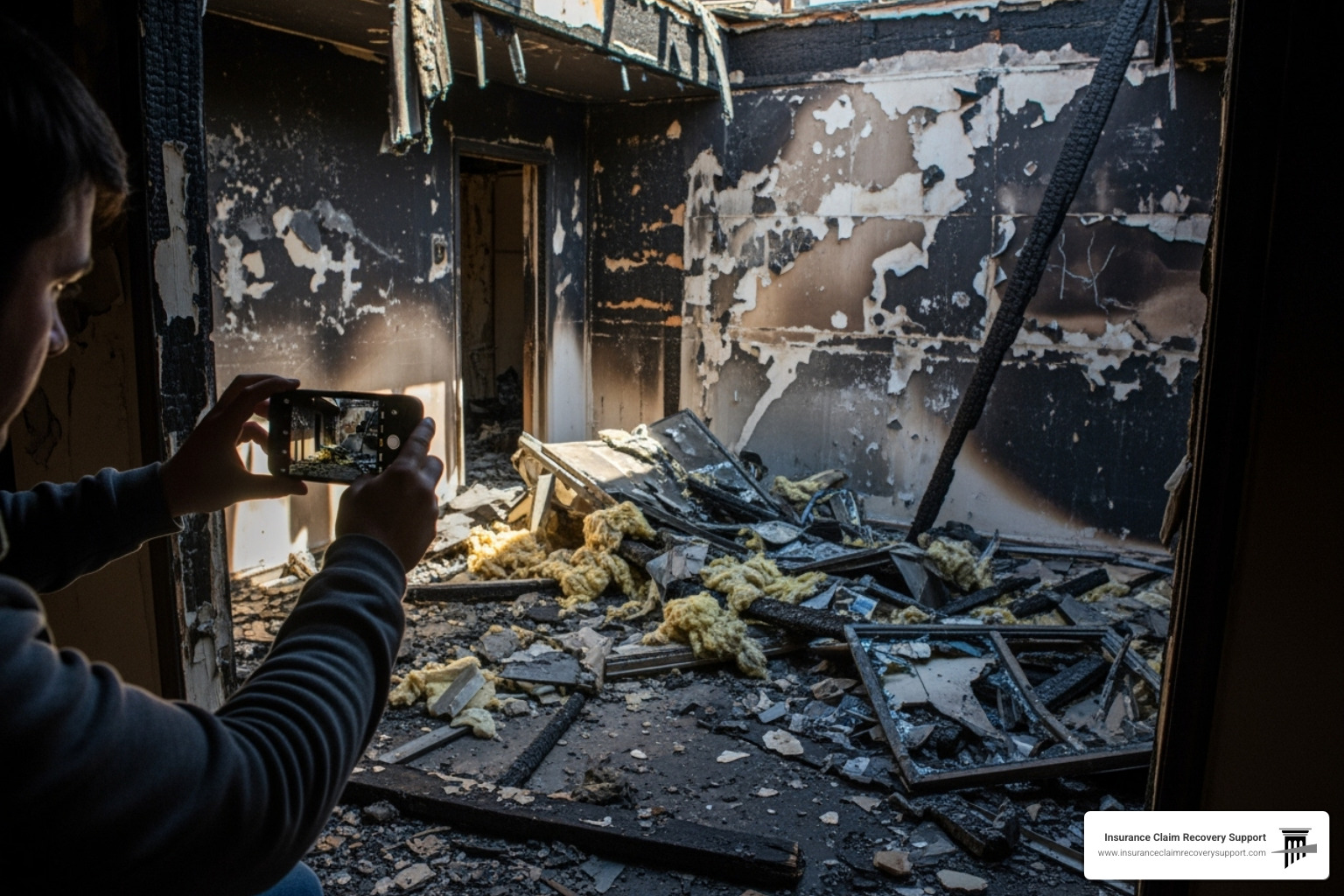
Here’s our blueprint for thorough documentation:
- Detailed Photo and Video Evidence: Before any cleanup, take photos and videos from multiple angles, capturing wide shots and close-ups of all fire, smoke, and water damage. Narrate videos to point out specific issues.
- Creating a Comprehensive Property Inventory: List every damaged or destroyed item owned by the property (fixtures, appliances, common area furnishings). Include descriptions, age, and estimated replacement cost. Gather receipts or other proof of value.
- Keeping Receipts for All Expenses: Start a dedicated file for every post-fire expense, including temporary repairs, mitigation, and security. These are vital for reimbursement.
- Obtaining the Official Fire Report: Get a copy of the report from your local fire department. It contains crucial, objective information about the fire’s cause and origin.
- Communication Log: Keep a detailed log of all communications with your insurance company. Note dates, names, and discussion points. This is invaluable if disputes arise.
We cannot overstate the importance of this meticulous documentation. It empowers your claim and ensures no detail is overlooked or undervalued.
Essential Documents for Your Claim:
- Official Fire Department Report
- Comprehensive Photo and Video Evidence of all damages
- Detailed Property Inventory with estimated values and supporting proof of ownership
- Receipts for all post-fire expenses (mitigation, security, etc.)
- Communication Log with the insurance company and adjusters
- Copies of your current insurance policy (including all endorsements)
- Lease agreements for affected units (for loss of rents claim)
- Any estimates from qualified contractors for repair/reconstruction
Maximizing Your Settlement: The Role of a Public Adjuster
Navigating an apartment fire insurance claim is about advocating for your full recovery. This is where a public adjuster is essential for securing the maximum settlement and avoiding litigation.
Company Adjuster vs. Public Adjuster: Who Works for You?
After you file a claim, your insurer sends a “company adjuster.” This person works for the insurance company, and their primary role is to protect the insurer’s financial interests by minimizing payouts. This creates a clear conflict of interest.
A public adjuster is a state-licensed professional who works exclusively for you, the policyholder. Our sole responsibility is to represent your interests and ensure you receive the maximum settlement allowed under your policy.
| Feature | Company Adjuster | Public Adjuster |
|---|---|---|
| Who They Represent | The Insurance Company | The Policyholder (You) |
| Primary Goal | Assess damage, determine liability, and minimize payout for the insurer | Independently assess damage and maximize payout for the policyholder |
| How They Are Paid | Salary from the Insurance Company | Percentage of the final settlement paid by the policyholder |
| Conflict of Interest | Yes, represents the insurer’s financial interests | No, interests are fully aligned with the policyholder |
| Expertise | Focus on insurer’s perspective and cost control | Focus on policyholder’s rights and full recovery |
For a deeper dive into these roles, learn more about What Does a Claims Adjuster Do? and the benefits of Licensed Public Adjusters.
How to Maximize Your Apartment Fire Insurance Claim with an Advocate
Maximizing your apartment fire insurance claim means accurately identifying and valuing all covered damages, many of which an insurer’s adjuster might overlook. A public adjuster acts as your advocate to ensure you don’t leave money on the table.

Here’s how we work to maximize your claim:
- Independent Damage Assessment: We conduct our own thorough inspection, using independent experts like engineers and industrial hygienists to find and document all damage, including hidden issues.
- Understanding Policy Language: We carefully review your policy and all endorsements to identify every applicable coverage for your fire loss, including business interruption, debris removal, and code upgrades.
- Actual Cash Value (ACV) vs. Replacement Cost Value (RCV): This is a critical distinction. ACV pays for the depreciated value of your property, while RCV covers the cost to replace it with new materials. Most commercial policies are RCV, and we ensure your claim is valued correctly so you can fully restore your property.
- Negotiating with the Insurer: Armed with our detailed assessment, we negotiate directly with your insurer. We present a comprehensive claim package, challenge low offers, and advocate for every dollar you are owed. We’ve seen initial offers increase by hundreds of thousands, even millions, after our involvement.
We are specialists in Fire Claims Public Adjuster services and excel in Insurance Settlement Negotiation, ensuring your claim reflects the true cost of recovery.
Avoiding a Lawsuit: The Public Adjuster Advantage
When a claim is denied or underpaid, many owners feel their only option is to sue. However, a lawsuit is often a long, expensive, and emotionally draining process that can delay your recovery for years.
A public adjuster offers a significant advantage by aiming to resolve your claim through negotiation, bridging the gap between the insurer’s offer and what you deserve without litigation.
- Resolution Through Negotiation: We act as a powerful intermediary, presenting a professionally documented claim backed by expert assessments to persuade the insurer to re-evaluate their position and pay fairly.
- Faster Settlement Times: A public adjuster can significantly expedite the claims process. We know how to properly submit documentation and keep the claim moving, getting you funds for repairs much sooner than a lawsuit would.
- Focus on Recovery, Not Litigation: We handle the stressful back-and-forth with the insurance company, freeing you to focus on rebuilding your property and managing your business.
In Texas, we provide expert Public Adjuster Services Texas that empower property owners to achieve fair settlements, making lawsuits a last resort, not a first response.
Common Problems: Claim Delays, Denials, and Underpayments
Even with thorough documentation, landlords can face claim delays, denials, or underpayments from insurance companies. Understanding these challenges is the first step to overcoming them.
Common Reasons for Denial of an Apartment Fire Insurance Claim
Facing a denied apartment fire insurance claim is devastating, but a denial is not always the final word. Common reasons for denial include:
- Arson Suspicion: If the insurer suspects the fire was intentionally set, they will investigate, which can lead to a denial even if you are innocent.
- Policy Violations: Your policy is a contract. Violations like late notification of the loss, misrepresenting facts, or failing to pay premiums can be grounds for denial.
- Failure to Maintain Property: If the fire was caused by a known, unaddressed maintenance issue (e.g., faulty wiring), the insurer might argue negligence and deny the claim.
- Inadequate Documentation: If you can’t sufficiently prove the extent of your damage and its value, the insurer may deny or, more commonly, underpay the claim.
- Failure to Mitigate: If you didn’t take reasonable steps to prevent further damage after the fire, the insurer might deny coverage for those subsequent losses.
- Disputed Cause of Fire: The insurer may attribute the fire to a cause that is not covered by your policy.
Insurance companies sometimes use these tactics strategically. For more insight, read about Why Insurance Companies Delay, Deny, and Dispute Claims on Purpose.
What to Do If Your Claim is Denied or Underpaid
A denied or underpaid apartment fire insurance claim is not the end of the road. We’ve helped countless property owners in Texas successfully overturn initial denials.
Here’s our recommended course of action:
- Review the Denial Letter Carefully: Your insurer must provide a written explanation for the denial. Understand the specific policy language they cite.
- Gather More Evidence: If the denial is due to poor documentation, bolster your case with expert reports, more detailed contractor estimates, or an independent fire investigator’s report.
- Initiate the Appeals Process: Formally appeal the decision through the insurer’s internal process, presenting your new evidence and arguments.
- Consider Filing a Complaint: In Texas, you can file a complaint with the Texas Department of Insurance (TDI). While the TDI can’t force payment, they can investigate if the insurer acted in bad faith, putting pressure on them to re-evaluate. Learn more about how to File a Complaint Against Your Insurance Company.
- Re-opening the Claim with a Public Adjuster: This is often the most effective step. We can step in on a denied, underpaid, or even closed claim. We conduct our own investigation, build a new, professionally prepared claim package, and negotiate directly with the insurer to get your claim re-evaluated and settled fairly, aiming to avoid a lawsuit.
Don’t give up. We specialize in helping policyholders with Denied Fire Insurance Claim situations and are ready to fight for your rightful compensation.
Frequently Asked Questions about Apartment Fire Claims
We understand property owners have many questions after an apartment fire. Here, we address some of the most common concerns.
What are the most common causes of apartment fires?
Understanding common fire causes helps with prevention. According to the NFPA, the most frequent causes of apartment fires include:
- Cooking Accidents: Unattended cooking is the leading cause of residential fires and injuries.
- Electrical Malfunctions: Faulty wiring, overloaded circuits, and defective appliances are significant contributors. Regular electrical inspections are key.
- Smoking Materials: Carelessly discarded cigarettes are a common and preventable cause.
- Heating Equipment: Malfunctioning furnaces and space heaters placed too close to combustibles pose a major risk, especially in colder months.
- Arson: Intentionally set fires cause devastating damage and lead to complex claims.
- Accidental Fires: This category includes fires started by candles, children playing with matches, or other mishaps.
As a landlord, you have a responsibility to ensure your property is maintained to minimize these risks. For more statistics, you can refer to NFPA data on residential fires.
How long does an apartment fire insurance claim typically take?
The timeline for an apartment fire insurance claim varies, from a few months to over a year for large-scale incidents. Factors influencing the duration include:
- Extent of Damage: A small, single-unit fire is resolved faster than a fire that damages an entire building.
- Cause and Origin Investigation: If the cause is disputed (e.g., potential arson), the investigation can be lengthy.
- Responsiveness of All Parties: Delays in communication between you, your contractors, and the insurer will slow the process.
- Negotiation Process: Significant disagreements between your valuation and the insurer’s offer will prolong the claim.
For large multi-family fire claims, the process can take six months to two years. However, a public adjuster can often expedite this timeline. By submitting a comprehensive claim package from the start and proactively negotiating, we can help you secure funds quicker to begin restoration and minimize business interruption.
What are my responsibilities to my tenants after a fire?
As a landlord, your duties to tenants extend beyond property repair. While their renters insurance covers their belongings and temporary housing, you have other obligations.
- Communication: Keep tenants informed about the building’s status, timelines for repair, and when they might retrieve belongings. Provide them with information to help them file their own renters insurance claims.
- Safety: Do not allow re-entry until the fire department and structural engineers declare the area safe.
- Lease Termination: Review your lease for clauses addressing uninhabitability. You will likely need to terminate leases for severely damaged units.
- Returning Security Deposits: If leases are terminated, you must return security deposits according to state law (e.g., within 30 days in Texas), minus any legitimate deductions.
- Providing Information for Their Claim: Assist tenants by providing the fire report and confirming the building’s uninhabitable status for their insurance provider.
Understanding local landlord-tenant laws in Texas cities like Austin, Dallas, or Houston is crucial. We can help you steer these complexities while you focus on your apartment fire insurance claim.
Conclusion: Rebuilding Your Property and Your Business
An apartment fire insurance claim is one of the most difficult challenges a property owner can face. The path from chaos to recovery is complex, but with proactive steps, meticulous documentation, and a clear understanding of your policy, you can significantly improve your outcome.
The value of professional advocacy is immense. When facing an insurer whose adjusters protect their bottom line, an experienced public adjuster levels the playing field. We ensure every loss is accounted for, every coverage is applied, and your claim is presented for its maximum value, helping you rebuild without the cost and delay of litigation.
At Insurance Claim Recovery Support LLC, we specialize in property damage claims for commercial buildings, multi-family HOAs, apartment complexes, and religious institutions. Whether your property is in Houston, Dallas, Fort Worth, San Antonio, or Austin, we understand the challenges Texas property owners face. We are your dedicated advocates, fighting for the compensation you deserve.
Don’t face your apartment fire insurance claim alone. Let us help you turn ashes into action.

